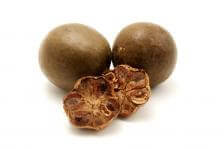Ask the Diva: Is Nectresse a Safer No-Calorie Sweetener?
Nectresse is the latest sweetener on the scene. Find out what it is and whether it’s safe.
Monica Reinagel, MS, LD/N, CNS

Q. I recently saw an ad for a new zero calorie sweetener called Nectresse. How does it stack up against other artificial sweeteners?Is is safer?
Answer. Nectresse™ is a new sweetener from the makers of Splenda, which is the brand name for the synthetic sweetener sucralose. Nectresse doesn’t contain any sucralose, however. Instead, it gets its sweetness from monk fruit extract and erythritol, which is a sugar alcohol.
See also: What are sugar alcohols?
Monk fruit extract comes from a fruit native to Central Asia called Luohan guo, which has been used in China for centuries. The fruit contains natural compounds that are extremely sweet (about 150 times sweeter than sugar) but low in carbohydrates and calories. These compounds can be isolated and used as a low-calorie sweetener.
I would put monk fruit extract in the same category as stevia-based sweeteners. Both can be considered to be more natural than the synthetic sweeteners in Splenda and Equal, but these sweeteners are hardly “as found in nature.” Both are highly processed ingredients.
As to their relative safety, Splenda and Equal are both considered to be perfectly safe ingredients. Despite this, consumers remain suspicious of them, which has fueled a demand for more “natural” alternatives. This creates an interesting dilemma for the makers of Splenda. On the one hand, they’re touting the appeal of Nectresse as a more “natural” sweetener. On the other, they have to defend Splenda as an equally wholesome option. (For an amusing example of corporate spin, visit the Nectresse website and click on the question “What’s the difference between natural and artificial sweeteners?”)
Here’s the bottom line on the various low-calorie sweeteners: Although they are all considered to be safe, I can understand why people might prefer a sweetener sourced from a fruit or herb over one manufactured in a test tube. Natural or not, they all contain negligible calories and have an insignificant effect on blood sugar. Nonetheless, a raft of evidence suggests that using low calorie sweeteners doesn’t help much with weight control. In the end, I still think that you’re best served by limiting the amount of sweetened foods and beverages in your diet—no matter how they are sweetened.
See also:
Pros and Cons of Artificial Sweeteners
All About Stevia
Aspartame and Cancer: An Update
Monk fruitopens IMAGE file from Shutterstock

